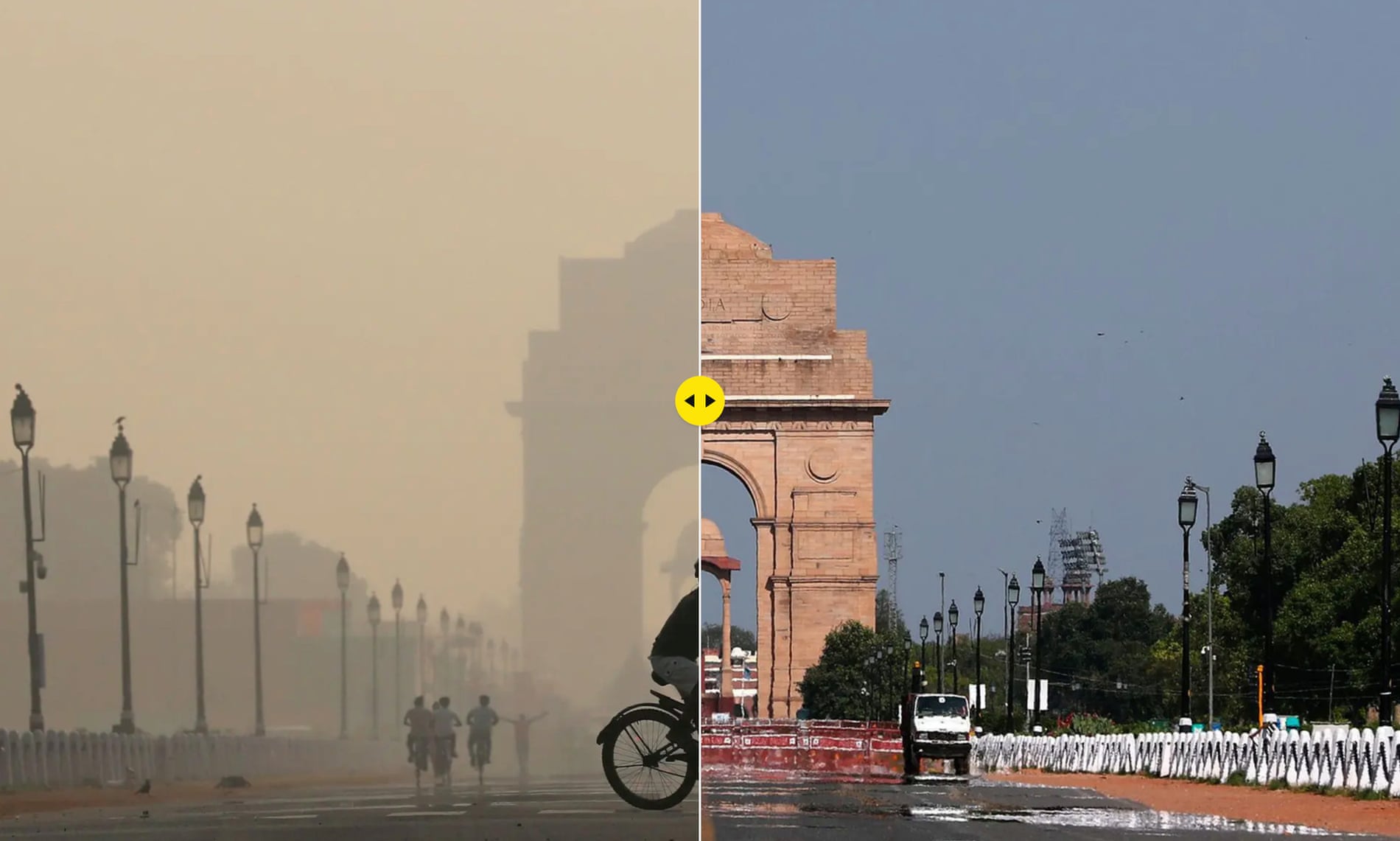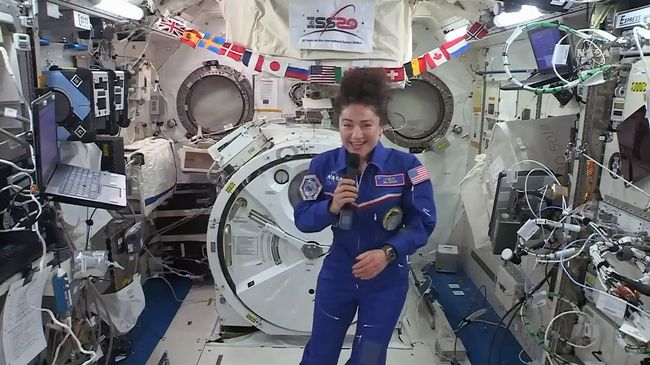Small business rescue loan program hits $349 billion limit and is now out of money
If you didn’t get a stimulus check yet, don’t panic—here’s how to see when it’s coming
New York taps McKinsey to develop a ‘Trump-proof’ economic reopening plan
New Jersey cops find 17 bodies stuffed inside tiny nursing home morgue
Sources believe coronavirus outbreak originated in Wuhan lab as part of China's efforts to compete with US
Unemployment claims near 17 million in three weeks as coronavirus ravages economy
'It's positively alpine!': Disbelief in big cities as air pollution falls Delhi is one of many capitals enjoying improved air quality since restrictions were introduced due to the coronavirus
The Shutdown Backlash Is Coming Soon—With a Vengeance It’s possible to support the stay-at-home order and still deeply resent it.
Trump claims NYC inflating its coronavirus death toll
COVID-19 Global Roundup: The grim crisis in care homes
Trump questions accuracy of China's coronavirus death toll "Some countries are in big, big trouble and they're not reporting the facts — and that's up to them," the president said.
South Korea's ruling party wins election landslide amid coronavirus outbreak Voters reward Moon Jae-in for response to pandemic with biggest majority since transition to democracy in 1987
Weekly jobless claims hit 5.245 million, raising monthly loss to 22 million due to coronavirus
Netflix eclipses Disney as coronavirus shakes up entertainment industry Netflix topped its streaming rival in market capitalization as Americans shelter in place.
Netflix Worth More Than Disney After Streamer’s Stock Hits All-Time High
Gold’s Gym permanently closing all Alabama locations
Stocks sink on Wall Street as grim economic news pours in
Stephen Colbert calls space station astronaut for social isolation tips "It's a little bit difficult for us to believe that we are truly going back to a different planet," Meir told Colbert in the live, space-to-ground interview, which aired on NASA TV. "And it was very strange to feel that there were three of us up here at the time — now there are six of us again — and we were really the only three humans that were not subjected to [the pandemic] at the current time," she added. "Billions of humans — everybody was dealing with this in somewhere or another and the three of us weren't so it was very strange to see it all unfold." ........ "Well, everybody here back on Earth is dealing with social isolation, and I understand that astronauts are actually trained to deal with isolation," Colbert responded. "Do you have any advice for the rest of us who might be getting cabin fever?" ................ "I think some of the things that help us up here are to continue to get our daily exercise, to keep to a schedule and a routine — those things are important for both our mental and our physical well being," she said. ........... As Colbert's fans probably expected, the talk show host took the opportunity to ask about the space station's treadmill — the Combined Operational Load-Bearing External Resistance Treadmill (COLBERT). The treadmill, which NASA named after Colbert, launched to the station in 2009 and is still up and "running," Meir said. ........... "I was just on the COLBERT treadmill a few hours ago. There's still a picture of you on it," Meir said, adding that the astronauts use it almost daily. "We weight lift every day and we either bike or run on the treadmill every day. It's very important for us to maintain our bone density and our muscle mass, so you are a regular part of our daily routine, Stephen." .......... Personal care is important when living in isolation, but it's equally important "to make sure that we're playing nicely with others" when isolated together with family members or roommates, Meir said. Much like small groups of astronauts who work together in space for months at a time, people living together in quarantine need "to treat each other kindly with respect," she added. ........... When Colbert asked her for tips on "how not to annoy the people you're trapped alone with for months on end," Meir stressed the importance of good teamwork skills and simply being pleasant — two important qualities in astronauts. "We even have a buzzword for that at NASA, it's called 'expeditionary skills,' and this is something that is very important in terms of how we select astronauts and how we train them," she said. .......... For example, an astronaut with strong "expeditionary skills" displays effective communication strategies, good leadership and good "followership," Meir said. "Taking care of yourself and all of your equipment and supplies" also helps to ease stress levels in the household, although "that can be quite a challenge up here when things are floating around and you're using all the surfaces around you," Meir said. .............. "I like to think of it as all the things that parents tell their children how to play nicely with others, or also the kind of people that I would want to go camping with," Meir said. "All of those features are really important." ......... Functionally happily together in isolation may require a bit of effort, but it's also important that we don't lose our funny bones in all the stress. "Keep having a little bit of fun as well," Meir said, adding that it's good for our psychological well being and overall health.
PREGNANT NURSE DIES FROM CORONAVIRUS, BUT EMERGENCY C-SECTION SAVES HER BABY GIRL
NYC medical residents treating coronavirus describe 'living a nightmare' They described their fears and hopes and said they never imagined they would have to bear witness to so much death this early in their careers as doctors.
Sorry, Immunity to Covid-19 Won't Be Like a Superpower It's nice to think that recovery will give you absolute protection, but that's not really how this works. ...... we can’t assume that any prior exposure to the virus will make it so a person can’t get sick again. Even if our bodies learn to fight the illness off, we don’t know how long this protection might endure. “Immunity after any infection can range from lifelong and complete to nearly nonexistent,” explained the epidemiologist Marc Lipsitch ........... The problem starts with just the word, immunity. It tends to conjure something binary: Either you have it or you don’t; either you’re a member of the superpowered legion of recovered, or you’re a vulnerable normie like the rest of us. ........
it’s possible protection from Covid-19 will only be short-lived, or that it only goes to some of those who get infected
...... an immunity continuum. ....... At the other end is no immunity at all, where a history of prior illness doesn’t seem to matter—or, indeed, where it could even make things worse. Having an immune response to one strain of the virus causing dengue fever, for example, can worsen your reaction to the other types. ..............a state you might think of as “immunishness,” an intermediate level of protection which dwindles over time.
......... We don’t even know which types of antibodies are most crucial for preventing SARS-CoV-2 from infecting cells. Without that information, it will be very hard to design blood tests that deliver reasonable estimates of the strength of someone’s immunity, in the sense of how likely they are to become infected or how severe their symptoms might be. ............. Previous studies of older, less dangerous coronaviruses seem to suggest that protection is short-lived: antibody levels fall off significantly within a few months, and continue to decline. ..........Those who recover from severe cases could end up with stronger immunity than those who were asymptomatic. .......... tests might be turning up false negatives and then later picking up signs of the initial infection. ....... In all the talk about issuing certificates or concert wristbands so that people who recover can be sent into our schools and nursing homes and shelters, we tend to overlook the often-squishy meaning of immunity. The truth is, our immune responses to this virus aren’t likely to be permanent or perfect. It’s nice to imagine that once someone’s been infected they become a knight in antibody armor, but that’s not really how it works.Wired: Coronavirus
Coronavirus News (43) https://t.co/2vZXFPGytl #WeAreNewYork #2020IsKarmaFor #HealthyAtHome #healthy #coronavirus #CoronavirusLockdown #CoronavirusPandemic #CoronavirusOutbreakindia #pandemic #lockdown
— Paramendra Kumar Bhagat (@paramendra) April 16, 2020
Watch as the Notre Dame bell rings for health workers pic.twitter.com/3LLT8mN8qp
— TIME (@TIME) April 16, 2020
Boulder today 😫 pic.twitter.com/RuSRDS7Hp3
— Kimbal Musk (@kimbal) April 16, 2020
New Yorkers are planning a citywide singalong to “New York, New York” tonight 🎵 https://t.co/NZB5cm9i5Y pic.twitter.com/EIyyW32u5m
— Time Out New York (@TimeOutNewYork) April 16, 2020
In my 53 years of seeing dumb things, defunding the WHO in the middle of a global pandemic is the winner.
— Andy Slavitt @ 🏡 (@ASlavitt) April 16, 2020
Surprising no one, United will lay off its workers after receiving a $58 billion taxpayer-funded bailout.
— Robert Reich (@RBReich) April 16, 2020
Bail out people. Not corporations.
my least favorite phrase right now is "reopen the economy," which means absolutely nothing
— rat king (@MikeIsaac) April 16, 2020
Hear me out, maybe the fact that 22 million Americans immediately had to file for unemployment because they live paycheck-to-paycheck says something about stagnant wages in America and shines line on a broken system.
— James Kosur (@JamesKosur) April 16, 2020
It's time to implement @AndrewYang's UBI plan. https://t.co/l8PSf1fTKr
Food for thought given this story, "Taiwan's coronavirus response is among the best globally"...
— Jake Tapper (@jaketapper) April 16, 2020
Could that be because the Taiwanese are among the most familiar with the duplicitous ways of the PRC government so they believed the worst immediately?https://t.co/C4Ht0tO9qz
Taiwan's coronavirus response is among the best globally On January 25, as the world was still waking up to the potential danger of the novel coronavirus spreading rapidly out of central China, two governments recorded four new infections within their territory. ........... Australia and Taiwan have similar sized populations of about 24 million people, both are islands, allowing strict controls over who crosses their borders, and both have strong trade and transport links with mainland China. Ten weeks on from that date, however, Australia has almost 5,000 confirmed cases, while Taiwan has less than 400. ....... Taiwan has a world-class health care system, with universal coverage. ........ "Taiwan rapidly produced and implemented a list of at least 124 action items in the past five weeks to protect public health" .......... Taiwan was one of the most at-risk areas outside of mainland China -- owing to its close proximity, ties and transport links. ....... Among those early decisive measures was the decision to ban travel from many parts of China, stop cruise ships docking at the island's ports, and introduce strict punishments for anyone found breaching home quarantine orders. .......... Taiwanese officials also moved to ramp up domestic face-mask production to ensure the local supply, rolled out islandwide testing for coronavirus -- including retesting people who had previously unexplained pneumonia -- and announced new punishments for spreading disinformation about the virus. ........ Well-trained and experienced teams of officials were quick to recognize the crisis and activated emergency management structures to address the emerging outbreak. ....... Taiwan's rapid and transparent response -- with medical officials holding daily briefings on the matter -- has been held up as an example of how democracies can still rein in epidemics, even as some were claiming only an autocratic government like China's could effectively control such a rapidly spreading virus. Taiwan also avoided the type of strict lockdowns that characterized the response in China and many other countries. .........



No comments:
Post a Comment